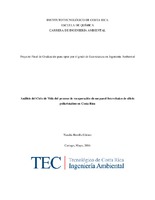Análisis del Ciclo de Vida del proceso de recuperación de un panel fotovoltaico de silicio policristalino en Costa Rica
Resumen
Within the last years, solar photovoltaic industry has grown considerably and currently Costa Rica
does not have a waste management plan for photovoltaic panels. For this reason, the environmental
profile of recovering a module according to the management alternatives arrangements available
in Costa Rica for waste treatment was assessed. In order to achieve this, a polycrystalline silicon
2
based photovoltaic panel was dismantled to characterize its materials. Once the materials were
characterized, an evaluation matrix was performed with variables that take into account the energy
and environmental point of view. According to the results obtained in the matrix, a Life Cycle
Assessment was performed in the SimaPro software, focusing on end-of-life phase. The study
shows that the recovery of materials would significantly contribute to reduce the environmental
profile of the end-of-life of polycrystalline modules. In total, the recovery of materials would
reduce the potential impact on climate change in the end-of-life from 1.43kg CO2 eq/m2 to -49.3kg
CO2 eq/m2 (approximate reduction of -50.73 kg CO2 eq/m2) and in terms of fossil fuels (oil) from
5.54MJ/m2 to -491.4MJ/m2 (approximate reduction of -496.94 MJ/m2). In Costa Rica there are
installed near 10544.24m2 of photovoltaic modules in the year 2015; if all the solar photovoltaic
capacity were recovered, the impact in climate change would be reduced by -534.91t CO2 eq, and
fossil depletion by -5.24TJ
Descripción
Proyecto de Graduación (Licenciatura en Ingeniería Ambiental) Instituto Tecnológico de Costa Rica, Escuela de Ingeniería Ambiental, 2016.


